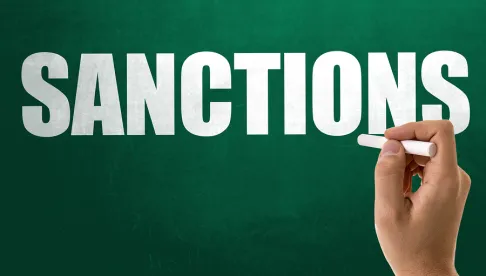On September 21, 2017, President Donald Trump issued Executive Order 13810 ("E.O. 13810" or "the Order"). The Order follows the recent Countering America's Adversaries through Sanctions Act ("CAATSA"), which directed the imposition of additional sanctions in connection with Iran, Russia and North Korea. The Order is particularly significant because it authorizes imposition of secondary sanctions – i.e., sanctions for conduct that does not have a connection to the United States – on foreign entities – including foreign financial institutions – for engaging in a wide variety of transactions involving North Korea. It also imposes a 180-day ban on aircraft and vessels that have stopped in North Korea or engaged in a ship-to-ship transfer with such a vessel. In addition, while the sanctions do not prohibit U.S. persons from traveling to North Korea, the Secretary of State has restricted the use of U.S. passports for North Korean travel. Special passport validation under 22 C.F.R. 51.64 is therefore required, and will issue only in limited circumstances.
U.S. persons were already broadly prohibited from transacting with North Korea.[1] Nonetheless, the new sanctions will significantly affect both U.S. and foreign businesses, by: (i) requiring foreign entities to cut business ties with North Korea or run the risk of being designated as blocked parties themselves and face civil forfeiture actions by the U.S. Department of Justice;[2] and (ii) creating significant risk of supply chain, customer, and logistics disruption for U.S. companies, particularly those that engage in business in North Korea trading partner countries, such as China and Russia.
As of October 5, 2017, designations under the Order include approximately two dozen individuals in North Korea and around the world, and a small number of financial institutions, five of which are identified as having a location outside North Korea, specifically in China.[3]
Effect of Designation
When a party (other than a foreign financial institution) is designated under the Order, their property and interests in property are blocked, making it unlawful for U.S. persons and persons in the U.S. to engage with them in almost any way, including by providing or receiving goods or services, and requiring the blocked property to be held, and reported to the Office of Foreign Assets Control ("OFAC").[4] With respect to foreign financial institutions designated under the Order, the Secretary of the Treasury has the option of blocking property, but may elect instead (merely) to prohibit opening new correspondent and payable-through accounts in the U.S. and to impose strict conditions on the maintenance of pre-existing accounts.
Triggers for Imposition of Secondary Sanctions
E.O. 13810 authorizes the imposition of secondary sanctions on foreign entities based on participation in a variety of North Korea-related transactions, as summarized in the table below.
|
Trigger for Sanctions |
Sanctions authorized |
|
Being a North Korean person,[5] particularly if "engaged in commercial activity that generates revenue for the Government of North Korea or the Workers' Party of Korea" |
Blocking of property and interests in property |
|
Engaging in any "significant" import or export of goods/services/technology from/to North Korea[6] |
|
|
Owning, controlling, or operating North Korean ports |
|
|
Operating in any of the following sectors in North Korea: energy, financial services, fishing, information technology, manufacturing, medical, mining, textiles, or transport |
|
|
Being owned or controlled by, acting on behalf of, or providing various forms of support to or for a party blocked under the Order |
|
|
For foreign financial institutions, "knowingly" conducting or facilitating any "significant" transaction in connection with N. Korea[7] |
Blocking of property and interests in property or prohibition of newcorrespondent and payable-through accounts in the U.S. and restrictions on maintaining existing accounts |
|
For foreign financial institutions, "knowingly" conducting or facilitating any "significant" transaction on behalf of any party blocked in connection with North Korea-related activities under Executive Orders 13551, 13687, 13722, or 13382 |
|
|
For funds originating from, being destined for, or passing through a foreign bank account that is (i) owned or controlled by a North Korean person, or (ii) used to transfer funds in which a N. Korean person has an interest |
Blocking of the funds[8] |
|
Calling at a N. Korean port or engaging in ship-to-ship transfer with a vessel that called at a N. Korean port within 180 days |
Barred from entering a U.S. port for 180 days |
General Licenses
Four General Licenses ("GL") permit specific, limited activities that would otherwise be prohibited by E.O. 13810, as follows:[9]
- GL-2 authorizes provision of certain legal advice, but the areas of advice are limited and payment for such services may require a specific OFAC license
- GL-3A authorizes U.S. financial institutions to debit normal service charges from blocked accounts
- GL-9 authorizes provision and receipt of nonscheduled emergency medical services
- GL-10 authorizes entry to U.S. ports of aircraft and vessels that would otherwise be barred for 180 days due to prohibited contact with North Korea, provided that the stop in North Korea or the U.S. was/is an emergency
In addition, the Order specifically provides that it does not "prohibit transactions for the conduct of the official business of the Federal Government or the United Nations (including its specialized agencies, programmes, funds, and related organizations) by employees, grantees, or contractors thereof."[10]
What to Do
Foreign entities wishing to avoid the risk of secondary sanctions will need to analyze their customer and vendor bases to identify existing trade links with North Korea, compare them to the sanctionable activities described in the Order, and address the links accordingly. Because secondary sanctions can also be imposed for providing various forms of support to parties blocked under the Order, foreign entities will also need to join their U.S. colleagues in screening transactions for (and avoiding transactions with) such parties, or risk being designated themselves.
For U.S. businesses, screening will continue to be an important tool to avoid transactions with parties designated under the Order. However, U.S. businesses, particularly those with significant customer or vendor relationships in North Korea trading partner countries, may also wish to proactively scrutinize and identify North Korea risk in their international customer and supplier relationships – now, before more waves of designations. Early review will help to minimize the risk of timely failure to block – or unauthorized post-designation performance on – contracts with foreign customers who may be designated in the future, as well as supply chain disruptions that may result from having to cease trade with foreign vendors who find themselves added to OFAC's list for North Korea involvement. Red flag and diligence procedures for new international customers and partners may also benefit from revision to account for the risk of future secondary sanction designations of foreign entities (e.g., advance inquiry and research into potential ties to the targeted sectors of North Korean industry, broader use of end-user and end-use assurances to prevent diversion, etc.).
[1] See Executive Orders 13466, 13551, 13570, 13687, 13722, 13810, and 15 C.F.R. 742.19, 746.4.
[2] For example, in June and August, the Department of Justice filed forfeiture suits targeting millions of dollars associated with Mingzheng International Trading Limited of China, Velmur Management Pte Ltd. of Singapore, and Dandong Chengtai Trading Co. Ltd. aka Dandong Zhicheng Metallic Material Co., Ltd. of China.
[3] The first designations under the Order can be found here. Designated banks with addresses in China are given as: (1) CHEIL CREDIT BANK (a.k.a. FIRST CREDIT BANK; f.k.a. "KYONGYONG CREDIT BANK"); SWIFT/BIC KYCBKPPYXXX; (2) HANA BANKING CORPORATION LTD; SWIFT/BIC BRBKKPPIXXX; (3) JINMYONG JOINT BANK; (4) KORYO COMMERCIAL BANK LTD.; SWIFT/BIC KCBKKPP1; and (5) RYUGYONG COMMERCIAL BANK.
[4] In addition to blocking property, the Order suspends immigrant and non-immigrant entry into the U.S. by individuals who are designated under the Order. See E.O. 13810, Section 5.
[5] In relevant part, the Order defines North Korean person to exclude U.S. citizens, lawful permanent residents, and aliens lawfully admitted or holding a valid U.S. visa. See E.O. 13810, Section 8(d).
[6] The term "significant" is not defined in the Order. While not determinative, some guidance may be drawn from the definition of the term in the Iranian Financial Sanctions Regulations, which set out seven factors that may play a role in the determination: (1) the size, number, and frequency of transactions; (2) the nature of the transaction(s); (3) the level of awareness of management and whether the transaction(s) are part of a pattern of conduct; (4) the nexus between the transaction(s) and a blocked person; (5) the impact of the transaction(s) on statutory objectives; (6) whether the transaction(s) involve deceptive practices; and (7) such other factors that the Secretary deems relevant on a case-by-case basis. See 31 C.F.R 561.404 for additional detail.
[7] The Order defines "[k]nowingly" to mean that "a person has actual knowledge, or should have known, of the conduct, the circumstance, or the result." E.O. 13810, Section 8(f).
[8] The Order does not create an immediate obligation for U.S. persons to identify and block such funds. According to FAQ #526, "OFAC will provide appropriate notice and additional guidance, as necessary, to clarify its expectations for implementation [of the requirement to block such funds]. Absent such a determination and notice from Treasury, this provision does not create any immediate compliance obligations on U.S. persons."
[9] "The general licenses previously issued with E.O. 13722 do not apply to transactions prohibited by E.O. 13810, except for General Licenses 2 and 9 with respect to legal services and emergency medical services, respectively. OFAC is also updating General License 3 to account for E.O. 13810." OFAC FAQ #525.
[10] E.O. 13810 Section 7.




 />i
/>i

